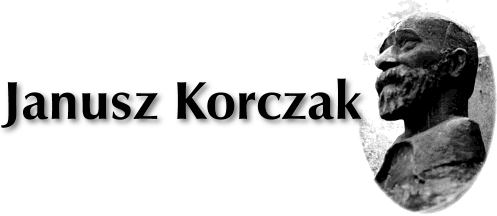
At the beginning of August 1942, Dr. Henryk Goldszmidt, better known by his pen name of Janusz Korczak, was deported with the children of his Orphanage to the gas chambers of Treblinka. The outrage shocked the Warsaw Ghetto and some eye-witnesses recorded it. One of them, Wladyslaw Szpillman, wrote:
The column was led by an SS man who like most of the Germans liked children, even those whom he was shortly going to kill. Particularly he seemed to be fond of twelve-year old violinist, who carried his instrument under his arm. He ordered him to take his place at the head of the column and to start playing and so they marched. When I met the procession on Gesia Street, all the children were singing together, with beaming faces, while the little violinist was playing. Korczak marched with two of the youngest children in his arms.
Korczak was a legend of his own time. Born into an assimilated Jewish family in Poland, he followed in the footsteps of his paternal grandfather, a physician, and his father, a prolific writer. He studied medicine, specializing in pediatrics. In 1904, he was drafted for the Russo-Japanesse war and ten years later, for World War I. In 1912 he received a grant to create a Jewish orphanage on Karmelicka 92 in Warsaw.
It became his laboratory in which he experimented with his method of institutional education, which he based on the developmental enhancement of a child's inborn abilities. After the wars in which he participated, he felt deeply that his world needed basic changes and he devised a motto: If you want to reform the world, first you must reform education.
Reaching into his childhood and formative years, he discovered that his upbringing and schooling were built on serious flaws, which surfaced in occassional pangs of distress and loneliness. He felt deprived of love and support, and in his mature years wrote a philosophical treatise entitled How to Love a Child. Deeply aware of his Jewish roots, he felt empathy with Jewish children, especially those in Orthodox families, who, who were afraid to leave their neighborhood and were severely restricted by their parents In this connection, he wrote Mosheks, Yoskes and Srulics and also Jewish Child in the Diaspora.
In his orphanage, known as our home, he tried to maintain an atmosphere of candid discussion and sharing of thoughts and ideas. He also encouraged expression of feelings in writing and assisted older children to establish their own newsletter, called Maly Przeglad (Little Review).
In the early 1930's, Korczak began to communicate with his former pupils who emigrated to Israel. They urged him to visit the country and he traveled there in 1932 and 1934. Visiting cities, kibbutzim and moshavim, he discovered a new world which he described In the Land of Israel, In the Kibbutzim and the Children of the Bible he also felt an urge to emigrate to the Holy Land, deeply regretting that his ancestors never spoke about it. And so the great educator and humanitarian returned to Poland with a deep yearning for Israel.
![]() Visit the Resource section to view photographs of Korczak monuments in Warsaw.
Visit the Resource section to view photographs of Korczak monuments in Warsaw.
![]() The complete script of the play, Korczak and the Children, by G. E. Farrell.
The complete script of the play, Korczak and the Children, by G. E. Farrell.
![]() The complete script of the play, Dr. Yanush Korczak, by Alina Kentof.
The complete script of the play, Dr. Yanush Korczak, by Alina Kentof.
![]() This Web site offering scores of photographs related to the life and work of Janusz Korczak was created by the son of one of the staff members at Korczak's orphanage.
This Web site offering scores of photographs related to the life and work of Janusz Korczak was created by the son of one of the staff members at Korczak's orphanage.
![]() Janusz Korczak Study Center offers many resources including excerpts of Korczak's writings.
Janusz Korczak Study Center offers many resources including excerpts of Korczak's writings.
![]() The complete text of The King of Children: The Life and Death of Janusz Korczak by Betty Jean Lifton.
The complete text of The King of Children: The Life and Death of Janusz Korczak by Betty Jean Lifton.
![]() Korczak entry from the Encyclopedia of the Holocaust.
Korczak entry from the Encyclopedia of the Holocaust.
![]() An extensive bibliography of books and articles related to Dr. Korczak is available at the Wiesenthal Center site.
An extensive bibliography of books and articles related to Dr. Korczak is available at the Wiesenthal Center site.
![]() View the Korczak memorial at Yad Vashem in Israel.
View the Korczak memorial at Yad Vashem in Israel.
| Victims | Perpetrators | Bystanders | Resisters | Rescuers | Liberators | Survivors |
Produced by the Florida Center for Instructional Technology,
College of Education, University of South Florida © 2000.